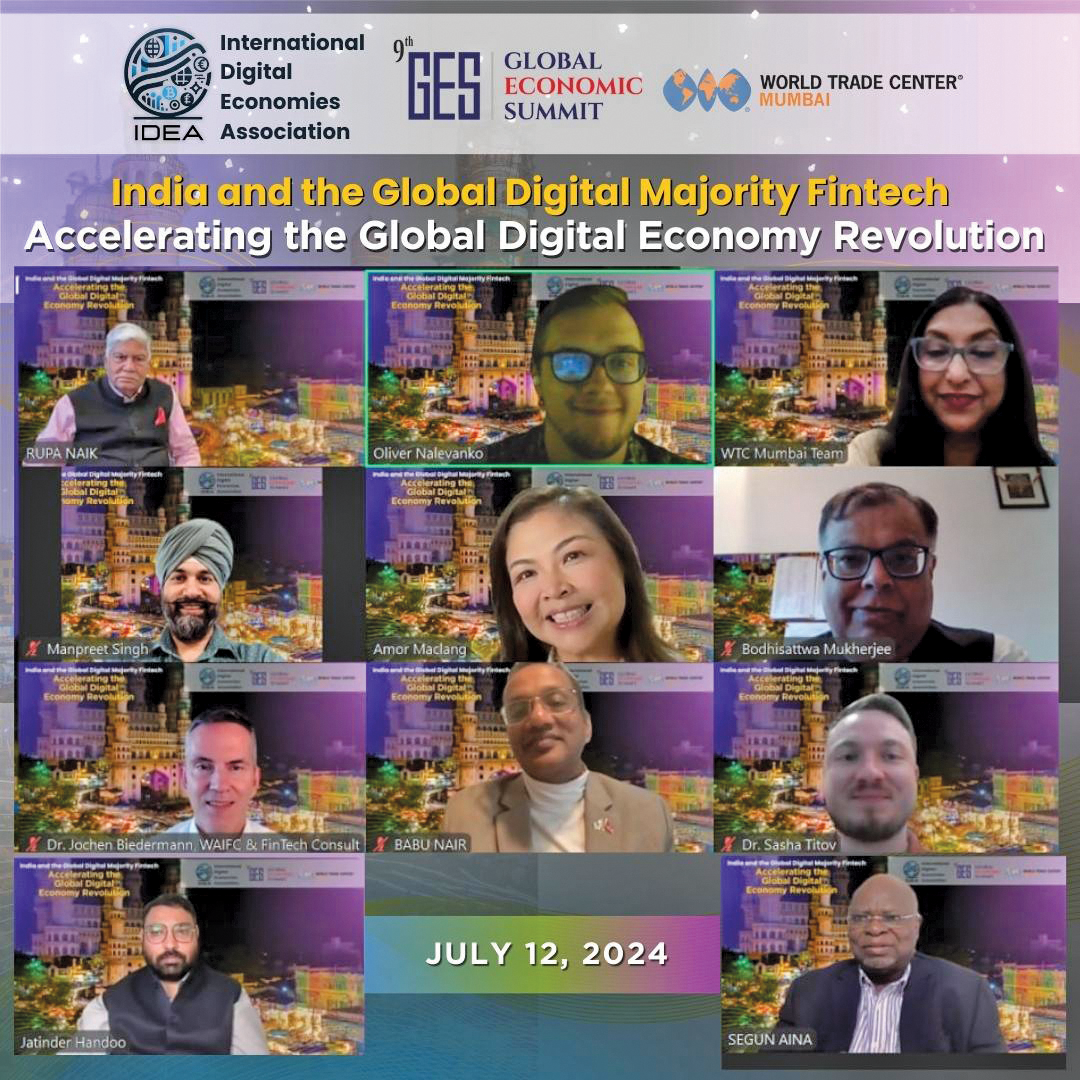India has proven its credentials as the Information Technology (IT) capital of the world and is now poised to lead the Global Digital Majority, representing the digital aspirations of Asia, Africa,
Latin America, and other developing countries that account for 86% of the world population.
World Trade Center Mumbai, in collaboration with the International Digital Economies Association (IDEA), organized a webinar featuring digital economy leaders from Asia and Africa to discuss the
roadmap for cross-border collaboration in cutting-edge digital technologies shaping the evolving fintech landscape.
The webinar was addressed by Dr. Vivek Raghavan, Advisor, UIDAI and Co-Founder, Sarvam AI, Dr. Jochen Biedermann, Managing Director World Alliance of International Financial Centers (WAIFC),
and Board Member & Co- Founder, IDEA, Mr. Ashish Singhal, CEO, India Banks’ Digital Infrastructure Company, Mr. Babu Nair, Ambassador, Singapore Fintech Festival and Founder & CEO, Financial
Technology Frontiers, Dr. Segun Aina, President, Africa Fintech Network, Co-Founder & Chairman, IDEA, Mr. Jatinder Handoo, CEO, Digital Lenders Association of India (DLAI), Mr, Manpreet Singh,
President, Indian Chamber of International Business
In his welcome address, Dr. Vijay Kalantri, Chairman, MVIRDC WTC Mumbai, emphasized the importance of digital infrastructure in transforming the MSME ecosystem and fostering inclusive and
sustainable economic growth. He said, “India, leveraging its widespread internet penetration and the availability of affordable smartphones, has developed a robust digital economy driven by
Digital Public Infrastructure (DPI) such as Aadhaar, UPI, and DigiLocker. India's digital economy, now the third largest in the world, has adopted a bottom-up approach, benefiting the weakest
sections of society, including MSMEs, street vendors, and women entrepreneurs. Fintech innovations such as digital payment solutions, regtech, and digital lending platforms have empowered MSMEs
and other small businesses by transforming and automating business and financial processes.”
Dr. Kalantri also extended an invitation to all participants to join WTC Mumbai in its annual flagship event, the Global Economic Summit, themed on Fintech for the current year. The GES is
expected to be a promising platform for the global fintech ecosystem to network and connect with local fintech companies and MSMEs in India.
Dr. Raghavan highlighted the role of DPI in fostering India's information economy. During the webinar, he remarked, "India is gradually emerging as the global information hub, propelled by
initiatives like Aadhar and UPI. The abundance of such vast data presents opportunities for India to harness technologies such as Generative AI, thereby enhancing accessibility and promoting social inclusion."
Dr. Raghavan also expressed optimism about UPI's prospects in the global market.
Recognizing India’s core strength in the IT sector, Dr. Biedermann recommended that India expedite its adoption of AI. He commented, "India is among the global leaders in the IT sector,
and its coding prowess is recognized worldwide. AI is emerging as the most crucial advancement in the IT industry. India, with its large, young, and talented workforce, has the potential to
capitalize on the AI sector." During the webinar, Dr. Biedermann also briefed participants about WAIFC and its role in fostering collaboration and cooperation among countries
in promoting the digital economy.
Mr. Singhal highlighted the benefits and challenges of asset tokenization in promoting cross-border transactions. He stated, "Through tokenization, any real asset can be converted into stable,
immutable, and transferable tokens. Given the high costs associated with cross-border transactions, such tokens can facilitate cost-effective border payments. However, the lack of a coherent
policy and regulatory framework, coupled with an uncertain tax structure, hinders the progress of tokenization in fostering cross-border payments."
Mr. Nair identified sectors where India could emerge as a global leader. He pointed to data centers and related fields, along with cross-border payment systems, as promising areas in India's
digital economy. He emphasized, “Given India's status as the world's remittance hub, there are strong incentives for Indian companies to innovate and enhance cross-border payment technologies.
The current global payment systems are not only slow but also costly, presenting significant opportunities for improvement. India has recently introduced cross-border licensing as well.”
Additionally, India holds potential to lead in global data center technologies, including cloud services, cybersecurity, and cyber insurance.
Speaking at the webinar, Mr. Handoo discussed the potential of digital lending solutions in India. He stated, "Currently, India has over 10,000 fintech companies, with the sector's total valuation
estimated to be around USD 25-30 billion. This sector is set to grow rapidly in the coming years. While the payment systems industry is thriving, there is significant potential for digital lending
platforms to expand, particularly given the large credit gap for MSMEs. The introduction of a Self-Regulatory Organization for fintech by the RBI could further facilitate the growth
of these platforms in India."
Talking about the evolving trends in Africa’s digital economy and the role of the Africa Fintech Network, Dr. Ina remarked, “India and Africa share similarities in terms of their culture and history.
Africa has long-standing trade relations with India, and fintech can be an emerging area for collaboration between the two nations. Just like in India, central banks in Africa are using fintech services
to drive financial inclusion. Africa, being the continent of the future, can explore collaboration with India in various areas of fintech, such as blockchain, central bank digital currencies (CBDC),
and knowledge sharing.”
Mr. Singh spoke about India’s role in the digital economy, highlighting its advantage in manpower. He said, “India is a leader in IT services, which have spread to Tier 2 and Tier 3 cities.
Various initiatives in the digital economy, such as post offices serving as export centers and faster cross-border payments through UPI, have enabled these smaller cities to significantly contribute to
the economy. India’s strength lies in creating such an ecosystem and taking it global. We can foster collaboration with partner countries by sharing these solutions and skills.”
The session was moderated by Ms. Amor Maclang, Founder and Chair, Digital Pilipinas and Ms. Rupa Naik, Executive Director, MVIRDC WTC Mumbai.


 : +91 7718886506
: +91 7718886506